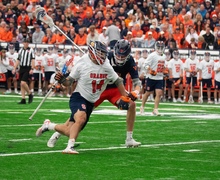Foot in the door: Repeal of ‘don’t ask, don’t tell’ takes first step toward military equality
Rob Smith remembers feeling isolated during his service in the U.S. Army on tours in Iraq and Kuwait. Being invited out for a drink by other male soldiers was particularly difficult as a gay man, he said.
‘I was very young when I was in the military when most people were in college and finding themselves,’ said Smith, a Syracuse University alumnus and freelance writer. ‘I was figuring out my sexuality under the backdrop of ‘don’t ask, don’t tell.”
After leaving the military, Smith came out while at SU. He then participated in rallies against the ‘don’t ask, don’t tell’ policy, including one in which he chained himself to the gate in front of the White House. Approximately two months later, he attended the ceremony hosted by the Department of the Interior announcing the repeal of the law.
‘I met President (Barack) Obama, got to shake his hand,’ he said. ‘It was a great experience, one that I won’t forget.’
The policy was repealed on Dec. 22 after being enforced since 1993. Though the repeal has been approved, there are still some steps to take until the effects can be seen.
The repeal will be finalized after Obama, Robert Gates, who is the Secretary of Defense, and Mike Mullen, the chairman of the Joint Chiefs of Staff, collaborate and make sure the policy will not affect the ability of military groups to deploy at any time. After an agreement is reached, there will be a 60-day period before the repeal is official. Until it is finalized, members of military groups still abide by the ‘don’t ask, don’t tell’ policy.
The repeal will affect military recruiting groups on college campuses, such as ROTC. Though there has been tension between lesbian, gay, bisexual and transgender groups at SU and ROTC in the past, the recent repeal may not have an immediate effect.
Thomas Keck, a political science professor and former member of the University Senate’s LGBT Concerns Committee, said the ‘don’t ask, don’t tell’ policy has previously created conflicts on campus. Because the statute restricts openly LGBT people to serve in the military and may kick out members believed to be LGBT, it conflicts with SU’s nondiscriminatory policy.
‘The university is sponsoring organizations themselves that are not open to all of the student groups on campus,’ Keck said.
Chancellor Nancy Cantor represented SU and signed a joint letter to Congress asking for a repeal of the ‘don’t ask, don’t tell’ policy in May, according to an article written by the Cornell University Chronicle. In March 2005, the Student Association approved a bill stating that the organization wanted military recruiters out of residence and dining halls because of the potential discrimination, according to an article published in The Daily Orange.
Keck said he was not aware of the current relationship between LGBT groups and ROTC. A representative from the LGBT Resource Center was unavailable for comment. Lt. Col. Ray Bowen of SU’s Air Force ROTC said in an e-mail, ‘The United States military, regardless of service, has always been comprised of many very patriotic men and women who have professionally implemented and/or followed the guidance and/or policies issued to them. The recent change in ‘don’t ask, don’t tell’ guidance and/or policy will be no different.’
Paula Johnson, a law professor at SU, is a part of a national organization that is trying to speed up the process to finalize the law.
The Society of American Law Teachers, the group with which Johnson is involved, acted as one of the plaintiffs in a U.S. Supreme Court case, FAIR v. Rumsfeld, debating the constitutionality of the law on college campuses. Though the group won in U.S. District Court, it lost the case in the Supreme Court. Johnson said this case was a step forward in the legal processes with the ‘don’t ask, don’t tell’ policy.
Johnson said if students wanted to participate in ROTC or similar military programs, they would not be able to be open about their sexuality until the repeal is finalized. She said there is still a lack of legal protection for LGBT students interested in joining the military.
Johnson said she hopes the official repeal will come soon. She cited the recent change in Congress as a potential roadblock.
‘There needs to be pressure. There was bipartisan support to repeal ‘don’t ask, don’t tell,’ but there were very few Republicans that joined that effort. With the majority of the House being Republican, and there still being opposition (of the repeal) in the Senate as well, it can potentially linger,’ she said.
Smith, the SU alumnus, has used his experience as a gay man in the military to talk to LGBT students across the country about the ‘don’t ask, don’t tell’ policy. He is currently looking for publishers for his memoir to come out in the fall. Though his time in the military is complete, Smith said the law is still prevalent today.
‘‘Don’t ask, don’t tell’ is not over,’ he said. ‘Soldiers still cannot come out right now. We need to keep the pressure on. That’s the most important thing: to make sure something happens in an expedited way.’
Published on January 16, 2011 at 12:00 pm




